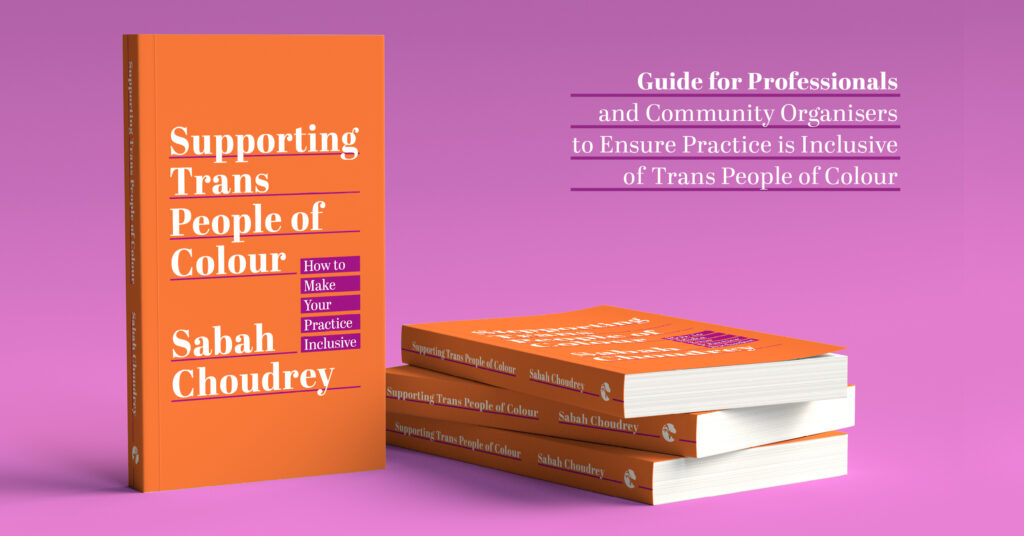How to Support Trans People of Colour – with Sabah Choudrey

Trans people of colour are often excluded from movements and services in trans and non-binary spaces because gender and race are treated as separate issues. Providing an accessible and authoritative introduction to issues around People of Colour (POC) trans inclusion, ‘Supporting Trans People of Colour’ uses case studies, tips, checklists and anonymous survey results to set out best practice for any professionals working with trans people to create safer spaces, support and awareness. We caught up with author Sabah Choudrey to talk more about their motivations for writing the book.
Was there a specific moment or event you can pinpoint that made you realise you needed you to write this book?
The ideas and content of the book all came from my own experiences of being a trans person of colour, navigating various sectors and facing tokenism, microaggressions, and not seeing any real change or improvements for trans people of colour. But it was desperation and determination that turned my experiences into words. I started writing and speaking publicly about what I was seeing and finding solace in community.
It was at this point when I was approached by Bernard Reed from GIRES (https://www.gires.org.uk/) who put together fact sheets about trans communities. He asked me to write a guide on how to support trans people of colour communities. I called it ‘Inclusivity’ (http://sabahchoudrey.com/inclusivity/) and we made paper and electronic copies available to the public for free. That was when I realised how much we all need something like this – a practical step by step guide to tell our supporters and allies how to support trans people of colour.
The book itself emerged when Andrew James from Jessica Kingsley Publishers asked me to write it, essentially! He read this guide and saw something bigger. It was an intimidating and anxiety inducing few years of allowing myself to be bigger and believing in myself. But it was deeper than just believing in myself, it was affirming my own difficult experiences and telling myself that I deserve much more – that trans people of colour deserve much more. After that, the book wrote itself.
In ‘Supporting Trans People of Colour,’ you include survey responses to the question: “What does a trans POC safe space mean to you and what does it look like?” If you were asked this, what would you say?
The first thing that comes to mind is being with my friends, other trans and non-binary people of colour, that have happened anywhere and anytime. They’ve happened on the high street, in corners of bars and cafes, on Zoom calls and more. They are moments of pure joy, laughter, talking about everything that’s not about being trans people of colour. Here, I am being seen for who I really am, where my identity doesn’t matter so much and yet I feel like I matter so much. You can’t really curate these moments, but they happen when we are feeling safe, visible to each other and the people who matter, when we are looking after ourselves and each other, and when we are together.
What would you encourage as a first step for people who are eager to start their journey towards becoming better allies?
Author Reni Eddo-Lodge talks about ‘The Big Question’ on her podcast titled ‘About Race’ (2018) when asked, what can we do? What can we do as allies to fight racism, what can non-Black people of colour do, what can the trans community do for intersex solidarity, what can we do for non-binary people? Eddo-Lodge continues to say, “I don’t know where you hold influence in your life. I don’t know your friends, I don’t know the extent of your jobs, I don’t know where you can assess where the institutional racism is really taking hold in your sector, what you as individuals can attempt to do to try and change that. I’m in no position to tell you how you can try and change the problem. But in terms of where you hold influence in your lives? In order to attempt to overcome the problem, only you can diagnose that.” So, what can you do?
A range of quotes from LGBTQIA+ POC writers, community activists, researchers and more, are woven into your book poignantly. What was the process of compiling these powerful voices like? And what motivated you to include them?
One of the toughest parts of writing this book was my own self-doubt and lack of confidence. I questioned myself a lot – who am I to write about this entire community, why am I the one writing this book, what gives me the right to speak for all these people? I realised that it’s not just me writing it and it’s not just my voice – it was necessary to include all these different voices not only because they are all my personal heroes and inspirations but also to show how incredible and truly diverse our community is in our experiences, skills and passions. This book is a personal celebration of how incredible our TPOC communities are.
Supporting Trans People of Colour is out now. You can help Sabah support more trans POC via their crowdfunder, here.